- Clone
- A16089B (See other available formats)
- Regulatory Status
- RUO
- Other Names
- Signal transducer and activator of transcription 3, Acute-phase response factor (APRF), HIES, ADMIO
- Isotype
- Mouse IgG1, κ
- Ave. Rating
- Submit a Review
- Product Citations
- publications
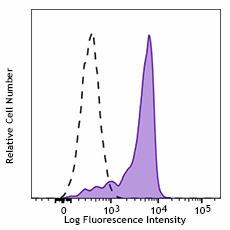
-

Human peripheral blood monocytes were treated with (filled histogram), or without (open histogram), Cell Activation Cocktail (Cat No. 423301) for 15 minutes, fixed with Fixation Buffer (Cat No. 420801), permeabilized with True-Phos™ Perm Buffer (Cat No. 425401), then intracellularly stained with Human TruStain FcX™ (Cat No. 422302) and purified anti-STAT3 Phospho (Ser727) (clone A16089B), followed by anti-mouse IgG PE. -

HeLa cells were fixed with 4% paraformaldehyde for 10 minutes, permeabilized with 0.5% Triton X-100 for 10 minutes, and blocked with 5% FBS for 60 minutes. Cells were then intracellularly stained with 2.5 µg/mL (1:200 dilution) of either Purified anti-mouse IgG1, κ Isotype Ctrl Antibody (Cat. No. 400102, left panel) or Purified anti-STAT3 Phospho (Ser727) Antibody, clone A16089B, for 2 hours at room temperature, after which proteins were visualized with Alexa Fluor® 594 Goat anti-mouse IgG Antibody (Cat. No. 405326) at 2.0 µg/mL. To demonstrate phospho-specificity of the clone, fixed cells were pre-treated with lambda protein phosphatase (LPP, right panel) prior to A16089B staining. Nuclei were counterstained with DAPI, and the image was captured with a 60X objective. -

Chromatin Immunoprecipitation (ChIP) was performed using commercial Protein-G coated 96 well high-throughput ChIP assay kit by loading 3 µg of cross-linked chromatin samples from HeLa cells starved overnight and then treated with IL-6 with either A) 1:50 dilution of Go-ChIP-Grade™ Purified anti-STAT3 Phospho (Ser727) Antibody (Clone A16089B), B) equal amount of Purified Mouse IgG1, κ Isotype Control Antibody (#400101), or C) competitor’s ChIP-grade Purified anti-STAT3 Phospho (Ser727) Antibody and D) equal amount of matched Isotype Control Antibody as recommended by the manufacturer. The enriched DNA was purified and quantified by real-time qPCR using primers targeting human IRF1 gene region. The amount of immunoprecipitated DNA in each sample is represented as signal relative to the 5% of total amount of input chromatin.
| Cat # | Size | Price | Save |
|---|---|---|---|
| 698901 | 25 µg | ¥32,340 | |
| 698902 | 100 µg | ¥71,060 |
The STAT3 transcription factor is an important signaling molecule for many cytokines and growth factor receptors and is required for murine fetal development. STAT3 is an 88 kD member of the STAT (signal transducer and activators of transcription) protein family that is phosphorylated in response to a cytokine receptor-associated kinase activity. Stat3 is activated by phosphorylation at Tyr705, which induces dimerization, nuclear translocation, and DNA binding. Transcriptional activation was reported to be regulated by phosphorylation at Ser727 through the MAPK or mTOR pathways.
STAT3 forms both homo- and heterotrimers and is involved in the activation of genes required for cell growth and apoptosis. STAT3 is also involved in gp130 signaling and binds to IL-6 response elements in various acute phase protein promoters. STAT3 is phosphorylated by signaling from IFNs, EGF, FGF, IL-5, HGF, LIF, and BMP2. STAT3 activity is inhibited by PIAS3 and GRIM-19 and can also be regulated by the Rac1 protein.
Product Details
- Verified Reactivity
- Human
- Antibody Type
- Monoclonal
- Host Species
- Mouse
- Immunogen
- Human Stat3 peptide phosphorylated at Ser 727. Complete Freund's adjuvant.
- Formulation
- Phosphate-buffered solution, pH 7.2, containing 0.09% sodium azide.
- Preparation
- The antibody was purified by affinity chromatography.
- Concentration
- 0.5 mg/ml
- Storage & Handling
- The antibody solution should be stored undiluted between 2°C and 8°C.
- Application
-
ICFC - Quality tested
ICC, ChIP - Verified - Recommended Usage
-
Each lot of this antibody is quality control tested by intracellular flow cytometry using our True-Phos™ Perm Buffer in Cell Suspensions Protocol. For flow cytometric staining, the suggested use of this reagent is ≤ 0.03 µg per million cells in 100 µl volume. For immunocytochemistry, a concentration of 2.5 μg/mL is recommended. For ChIP applications, the suggested dilution is 1:50-1:100 by volume. It is recommended that the reagent be titrated for optimal performance for each application.
- Application Notes
-
The STAT3 Phospho (Ser727) antibody recognizes the regulatory serine phosphorylation of human STAT3 protein.
- RRID
-
AB_2728515 (BioLegend Cat. No. 698901)
AB_2728515 (BioLegend Cat. No. 698902)
Antigen Details
- Structure
- STAT3 is a 770 amino acid protein of 88 kD. It consists of a DNA binding domain, a SH2 domain, a regulatory tyrosine responsible for binding of SH2 domain, and a C-terminal transactivation domain.
- Distribution
-
Ubiquitous
- Function
- STAT3 is also involved in gp130 signaling and binds to IL-6 response elements in various acute phase protein promoters. STAT3 is phosphorylated by signaling from IFNs, EGF, FGF, IL-5, HGF, LIF, and BMP2. STAT3 activity is inhibited by PIAS3 and GRIM-19 and can also be regulated by the Rac1 protein.
- Interaction
- When activated, STAT3 dimerizes and translocates to the nucleus where it regulates gene expression.
- Biology Area
- Cell Biology, Neuroscience, Neuroscience Cell Markers, Signal Transduction, Transcription Factors
- Molecular Family
- Nuclear Markers, Phospho-Proteins
- Antigen References
-
1. Akira S, et al. 1994. Cell. 77:63.
2. Zhang X, et al. 1995. Science 267:1990.
3. Sanchez-Margalet V, et al. 2001. Cell. Immunol. 211:30.
4. Simon A, et al. 2000. Science 290:144.
5. Hoey T, et al. 1999. Adv. Immunol. 71:145. - Gene ID
- 6774 View all products for this Gene ID
- Specificity (DOES NOT SHOW ON TDS):
- STAT3 Phospho Ser727
- Specificity Alt (DOES NOT SHOW ON TDS):
- STAT3 Phospho
- App Abbreviation (DOES NOT SHOW ON TDS):
- ICFC,ICC,ChIP
- UniProt
- View information about STAT3 Phospho Ser727 on UniProt.org
Related Protocols
- BioLegend’s Tools for Chromatin Immunoprecipitation (ChIP) Assays - Video
- Chromatin Immunoprecipitation (ChIP) Assay Protocol
- Immunocytochemistry Staining Protocol
- Intracellular Staining With True-Phos™ Perm Buffer in Cell Suspensions Protocol
- Intracellular Staining With True-Phos™ Perm Buffer in Whole Blood
Related Pages & Pathways
Pages
Other Formats
View All STAT3 Phospho Reagents Request Custom Conjugation| Description | Clone | Applications |
|---|---|---|
| PE anti-STAT3 Phospho (Ser727) | A16089B | ICFC |
| Purified anti-STAT3 Phospho (Ser727) | A16089B | ICFC,ICC,ChIP |
| PerCP/Cyanine5.5 anti-STAT3 Phospho (Ser727) | A16089B | ICFC |
| PE/Cyanine7 anti-STAT3 Phospho (Ser727) | A16089B | ICFC |
| Alexa Fluor® 488 anti-STAT3 Phospho (Ser727) | A16089B | ICFC |
| Brilliant Violet 421™ anti-STAT3 Phospho (Ser727) | A16089B | ICFC |
| Alexa Fluor® 647 anti-STAT3 Phospho (Ser727) | A16089B | ICFC |
Compare Data Across All Formats
This data display is provided for general comparisons between formats.
Your actual data may vary due to variations in samples, target cells, instruments and their settings, staining conditions, and other factors.
If you need assistance with selecting the best format contact our expert technical support team.
-
PE anti-STAT3 Phospho (Ser727)
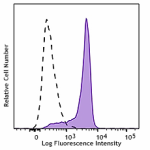
Human peripheral blood monocytes were treated with (filled h... -
Purified anti-STAT3 Phospho (Ser727)
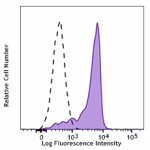
Human peripheral blood monocytes were treated with (filled h... 
HeLa cells were fixed with 4% paraformaldehyde for 10 minute... 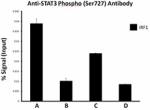
Chromatin Immunoprecipitation (ChIP) was performed using com... -
PerCP/Cyanine5.5 anti-STAT3 Phospho (Ser727)
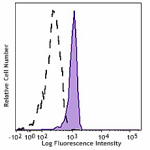
Human peripheral blood monocytes were treated with (filled h... -
PE/Cyanine7 anti-STAT3 Phospho (Ser727)
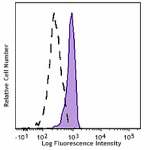
Human peripheral blood monocytes were treated with (filled h... -
Alexa Fluor® 488 anti-STAT3 Phospho (Ser727)
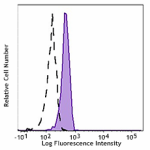
Human peripheral blood monocytes were treated with (filled h... -
Brilliant Violet 421™ anti-STAT3 Phospho (Ser727)
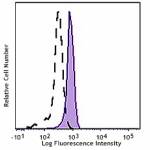
Human peripheral blood monocytes were treated with (filled h... -
Alexa Fluor® 647 anti-STAT3 Phospho (Ser727)
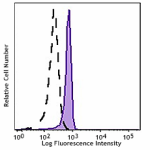
Human peripheral blood monocytes were treated with (filled h...







Follow Us